职场英文面试常见问题三
- 格式:docx
- 大小:15.18 KB
- 文档页数:4
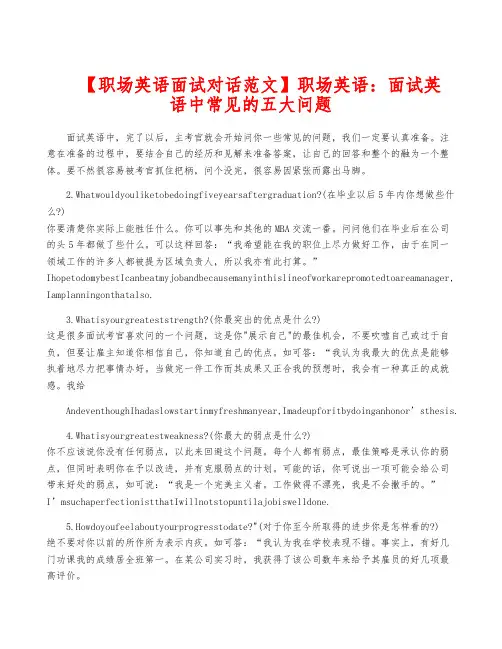
【职场英语面试对话范文】职场英语:面试英语中常见的五大问题面试英语中,完了以后,主考官就会开始问你一些常见的问题,我们一定要认真准备。
注意在准备的过程中,要结合自己的经历和见解来准备答案,让自己的回答和整个的融为一个整体。
要不然很容易被考官抓住把柄,问个没完,很容易因紧张而露出马脚。
2.Whatwouldyouliketobedoingfiveyearsaftergraduation?(在毕业以后5年内你想做些什么?)你要清楚你实际上能胜任什么。
你可以事先和其他的MBA交流一番。
问问他们在毕业后在公司的头5年都做了些什么。
可以这样回答:“我希望能在我的职位上尽力做好工作,由于在同一领域工作的许多人都被提为区域负责人,所以我亦有此打算。
”IhopetodomybestIcanbeatmyjobandbecausemanyinthislineofworkarepromotedtoareamanager, Iamplanningonthatalso.3.Whatisyourgreateststrength?(你最突出的优点是什么?)这是很多面试考官喜欢问的一个问题,这是你"展示自己"的最佳机会,不要吹嘘自己或过于自负,但要让雇主知道你相信自己,你知道自己的优点。
如可答:“我认为我最大的优点是能够执着地尽力把事情办好。
当做完一件工作而其成果又正合我的预想时,我会有一种真正的成就感。
我给AndeventhoughIhadaslowstartinmyfreshmanyear,Imadeupforitbydoinganhonor’sthesis.4.Whatisyourgreatestweakness?(你最大的弱点是什么?)你不应该说你没有任何弱点,以此来回避这个问题。
每个人都有弱点,最佳策略是承认你的弱点,但同时表明你在予以改进,并有克服弱点的计划。
可能的话,你可说出一项可能会给公司带来好处的弱点,如可说:“我是一个完美主义者。
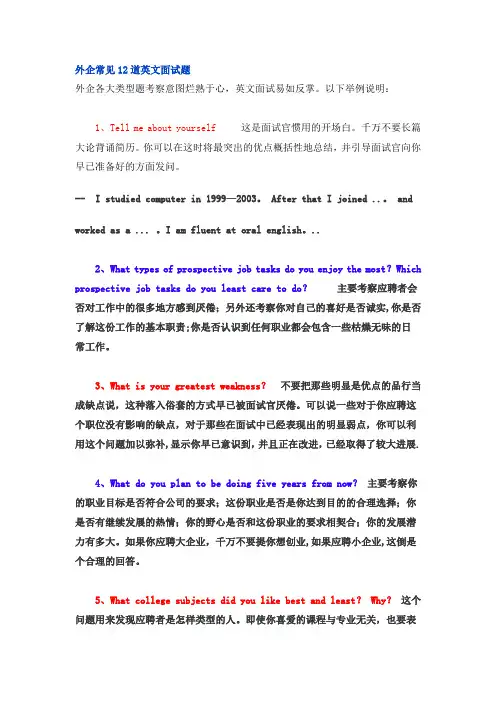
外企常见12道英文面试题外企各大类型题考察意图烂熟于心,英文面试易如反掌。
以下举例说明:1、Tell me about yourself这是面试官惯用的开场白。
千万不要长篇大论背诵简历。
你可以在这时将最突出的优点概括性地总结,并引导面试官向你早已准备好的方面发问。
-- I studied computer in 1999—2003。
After that I joined ..。
andworked as a ... 。
I am fluent at oral english。
..2、What types of prospective job tasks do you enjoy the most?Which prospective job tasks do you least care to do?主要考察应聘者会否对工作中的很多地方感到厌倦;另外还考察你对自己的喜好是否诚实,你是否了解这份工作的基本职责;你是否认识到任何职业都会包含一些枯燥无味的日常工作。
3、What is your greatest weakness?不要把那些明显是优点的品行当成缺点说,这种落入俗套的方式早已被面试官厌倦。
可以说一些对于你应聘这个职位没有影响的缺点,对于那些在面试中已经表现出的明显弱点,你可以利用这个问题加以弥补,显示你早已意识到,并且正在改进,已经取得了较大进展.4、What do you plan to be doing five years from now?主要考察你的职业目标是否符合公司的要求;这份职业是否是你达到目的的合理选择;你是否有继续发展的热情;你的野心是否和这份职业的要求相契合;你的发展潜力有多大。
如果你应聘大企业,千万不要提你想创业,如果应聘小企业,这倒是个合理的回答。
5、What college subjects did you like best and least? Why?这个问题用来发现应聘者是怎样类型的人。
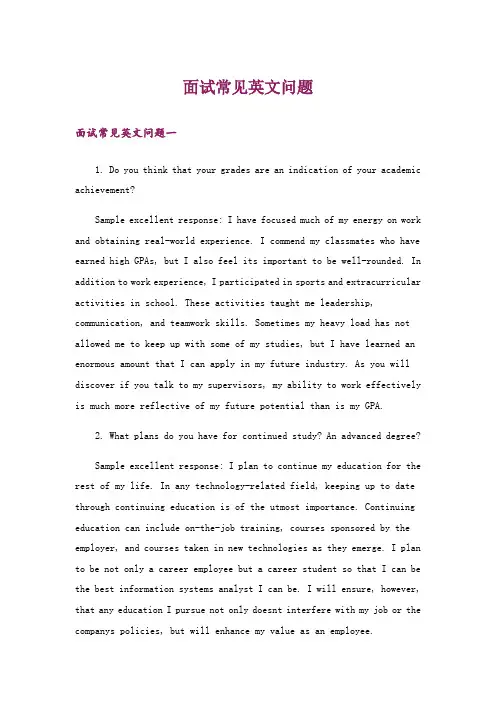
面试常见英文问题面试常见英文问题一1. Do you think that your grades are an indication of your academic achievement?Sample excellent response: I have focused much of my energy on work and obtaining real-world experience. I commend my classmates who have earned high GPAs, but I also feel its important to be well-rounded. In addition to work experience, I participated in sports and extracurricular activities in school. These activities taught me leadership, communication, and teamwork skills. Sometimes my heavy load has not allowed me to keep up with some of my studies, but I have learned an enormous amount that I can apply in my future industry. As you will discover if you talk to my supervisors, my ability to work effectively is much more reflective of my future potential than is my GPA.2. What plans do you have for continued study? An advanced degree?Sample excellent response: I plan to continue my education for the rest of my life. In any technology-related field, keeping up to date through continuing education is of the utmost importance. Continuing education can include on-the-job training, courses sponsored by the employer, and courses taken in new technologies as they emerge. I plan to be not only a career employee but a career student so that I can be the best information systems analyst I can be. I will ensure, however, that any education I pursue not only doesnt interfere with my job or the companys policies, but will enhance my value as an employee.3. Before you can make a productive contribution to the company, what degree of training do you feel you will require?Sample excellent response: My background has been focused on preparing me for the financial consulting industry, so I can be productive right away. I already have obtained the educational credentials and skills to allow me to become an immediate asset to Merrill Lynch. After interning for a semester, I am well aware of the shared beliefs of the organization and its corporate values. I already have a very good working knowledge of the financial consulting business. I am confident of my ability to get up to speed quickly in any assignment with which Im not familiar.4. Describe the characteristics of a successful manager.Sample excellent response: A successful manager should have the vision and capabilities to formulate strategies to reach his or her objectives and communicate these ideas to his or her team members. In addition to serving as a positive role model for co-workers, successful managers must also be capable of inspiring others to recognize, develop, and apply their talents to their utmost potential to reach a common goal. These are the traits I hope to demonstrate when Im a manager.5. Why did you decide to seek a position in this field?Sample excellent response: I want to work in the marketing and PR industry because ever since I took my first marketing course in college, I have felt very passionate toward the industry and cannot imagine myself doing anything else.面试常见英文问题二1. Tell me what you know about our company.Sample excellent response: Youre large and respected worldwide. Youre both a clinical and teaching hospital. Over the last 60 to 70 years youve produced award-winning research. In reviewing your Web site, Ive familiarized myself with many of your corporate goals and objectives. [Submitted by "Judy"]2. Why did you decide to seek a position in this company?Sample excellent response: I am convinced that there would be no better place to work than Accenture. You are the top consulting firm in the United States. You provide your employees with the tools they need to stay competitive and sharpen their skills while working in an open, team-based environment. I am also aware that you provide a mentor for all new employees, and I would embrace any opportunity to work with a mentor and eventually become one myself.3. Do you have a geographic preference?Sample excellent response: Although I would prefer to stay in the Mid-Atlantic area, I would not rule out other possibilities.4. Why do you think you might like to live in the community in which our company is located?Sample excellent response: Just a few weeks ago, I had the opportunity to spend several days in your community, and I fell in love with it. I love the fact that you have a thriving riverfront. Im impressed with the many cultural opportunities here -- opera, theater, art, and independent films. Ive also already become a fan of the Saints and the other sportsteams based here. I have conducted significant Internet research on this city, so I am quite comfortable with your location.5. Would it be a problem for you to relocate?Sample excellent response: Im open to opportunities within the company; if those opportunities involve relocation, I would certainly consider it.面试常见英文问题三1. If you could change or improve anything about your college, what would it be?Sample excellent response: My major department had a wonderful internship program, and I was able to complete three valuable internships with my departments guidance. Some other departments in the business school dont have internship programs that are as strong as my departments. Id like to see all the departments have strong internship programs so all my schools business grads would have the same opportunities that I had.2. How will the academic program and coursework youve taken benefit your career?Sample excellent response (response is very specific to the job he is interviewing for): As you will note on my resume, Ive taken not only the required core classes for the finance field, Ive also gone above and beyond by double majoring in accounting. I doubled majored since I knew that the financial consulting field requires much knowledge of portfolio analysis and understanding of the tax laws. I believe that my success inboth areas of study have specifically prepared me for this area. But its not just taking the classes in these two areas that allow me to offer Merrill Lynch clients more. I minored in Spanish to understand the growing his panic clientele in the Central Florida area, which as you are well aware is a growing source of revenue for the industry. If you like, I can elaborate on other aspects of my education further.3. Which college classes or subjects did you like best? Why?Sample excellent response: My favorite classes have been the ones pertaining to my major, which is marketing. These classes have laid the groundwork for my career in marketing. They have also taught me skills that I can bring to my employer, ranging from communication skills to interacting with others.4. Are you the type of student for whom conducting independent research has been a positive experience?Sample excellent response: Yes, I love it. I thoroughly enjoyed my senior research in college while many others in my class were miserable.I was never tired of learning more about my topic and found it exhilarating to be researching something that had not been studied before.5. Describe the type of professor that has created the most beneficial learning experience for you.Sample excellent response: My favorite professors were the ones who gave me hands-on learning experiences that I can apply to my career. Any person can make you memorize the quadratic equation, but someone who can show you how to use it, and why, were the professors I liked. I likedteachers who realized that sometimes there is more than one answer and everyone thinks differently.。
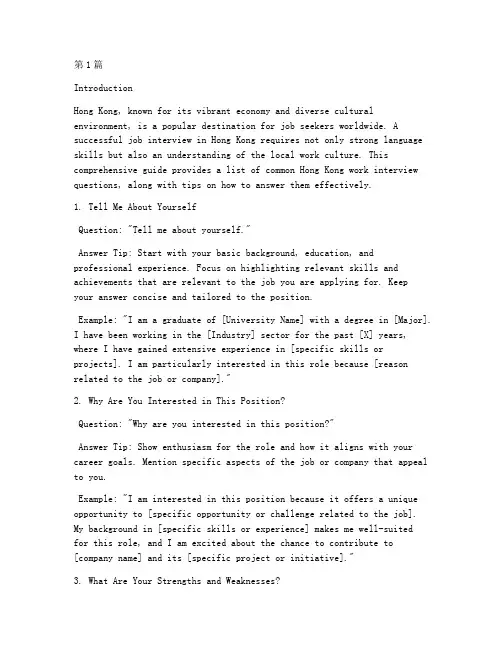
第1篇IntroductionHong Kong, known for its vibrant economy and diverse cultural environment, is a popular destination for job seekers worldwide. A successful job interview in Hong Kong requires not only strong language skills but also an understanding of the local work culture. This comprehensive guide provides a list of common Hong Kong work interview questions, along with tips on how to answer them effectively.1. Tell Me About YourselfQuestion: "Tell me about yourself."Answer Tip: Start with your basic background, education, and professional experience. Focus on highlighting relevant skills and achievements that are relevant to the job you are applying for. Keepyour answer concise and tailored to the position.Example: "I am a graduate of [University Name] with a degree in [Major].I have been working in the [Industry] sector for the past [X] years, where I have gained extensive experience in [specific skills or projects]. I am particularly interested in this role because [reason related to the job or company]."2. Why Are You Interested in This Position?Question: "Why are you interested in this position?"Answer Tip: Show enthusiasm for the role and how it aligns with your career goals. Mention specific aspects of the job or company that appeal to you.Example: "I am interested in this position because it offers a unique opportunity to [specific opportunity or challenge related to the job]. My background in [specific skills or experience] makes me well-suitedfor this role, and I am excited about the chance to contribute to [company name] and its [specific project or initiative]."3. What Are Your Strengths and Weaknesses?Question: "What are your strengths and weaknesses?"Answer Tip: Focus on strengths that are relevant to the job and be honest about your weaknesses. When discussing weaknesses, provide examples of how you have worked to improve them.Example:Strengths: "I am a highly organized individual with strong problem-solving skills. I am also a good team player and have excellent communication abilities."Weaknesses: "I sometimes struggle with time management when I have multiple projects due simultaneously. However, I have been working on this by setting clear priorities and deadlines, and I have seen significant improvement in my efficiency."4. Can You Describe a Challenge You Have Faced at Work and How You Dealt With It?Question: "Can you describe a challenge you have faced at work and how you dealt with it?"Answer Tip: Choose a challenge that demonstrates your problem-solving and resilience skills. Focus on the steps you took to overcome the challenge and the outcome.Example: "In my previous role, we faced a significant increase in customer inquiries due to a new product launch. I was responsible for managing the customer service team, and we were struggling to keep up with the volume. I implemented a new system to prioritize and route inquiries, which helped us reduce response times by 20%. This experience taught me the importance of effective communication and teamwork in times of crisis."5. How Do You Handle Stress and Pressure?Question: "How do you handle stress and pressure?"Answer Tip: Discuss your strategies for managing stress, such as taking breaks, exercising, or seeking support from colleagues. Avoid negative comments about stress.Example: "I find that exercise and maintaining a healthy work-life balance are crucial for managing stress. I also like to take shortbreaks throughout the day to clear my mind and refocus. When under pressure, I try to stay calm and prioritize tasks based on urgency and importance."6. Why Should We Hire You?Question: "Why should we hire you?"Answer Tip: Highlight your unique skills, experience, and personality traits that make you a good fit for the job. Be specific about how you can contribute to the company.Example: "I believe I am the ideal candidate for this role because of my [specific skills or experience]. I have a proven track record of [specific achievements], and I am committed to [company values or goals].I am also passionate about [industry or company mission], which drives me to excel in my work."7. Do You Have Any Questions for Us?Question: "Do you have any questions for us?"Answer Tip: Prepare thoughtful questions that demonstrate your interest in the job and company. Avoid questions that can be easily found in the company's website or brochures.Example:"Can you tell me more about the team I would be working with?""What are the company's expectations for professional development and growth?"8. Closing RemarksQuestion: "Is there anything else you would like to add before we conclude the interview?"Answer Tip: Use this opportunity to reiterate your interest in the position and express gratitude for the opportunity to interview.Example: "I would like to thank you for the opportunity to interview for this position. I am excited about the possibility of joining [company name] and contributing to its success. I look forward to the possibility of working together."ConclusionA well-prepared response to Hong Kong work interview questions can significantly increase your chances of securing a job offer. By following these tips and practicing your answers, you can present yourself as a confident and qualified candidate. Good luck with your interview!第2篇引言在香港,无论是本土企业还是跨国公司,英文面试已成为职场招聘的重要环节。
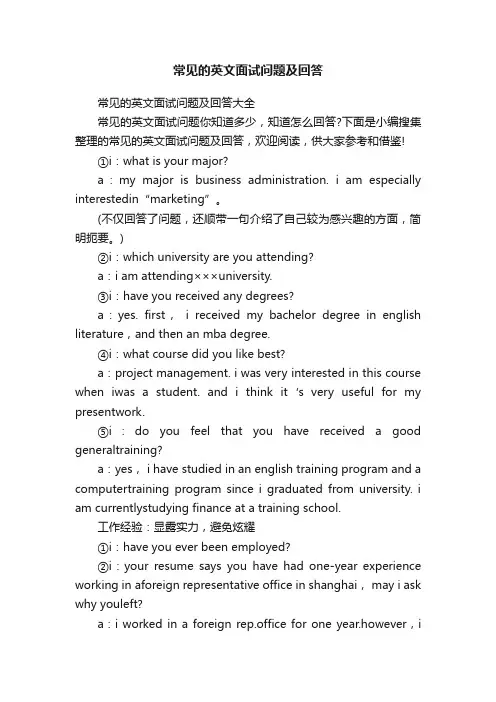
常见的英文面试问题及回答常见的英文面试问题及回答大全常见的英文面试问题你知道多少,知道怎么回答?下面是小编搜集整理的常见的英文面试问题及回答,欢迎阅读,供大家参考和借鉴!①i:what is your major?a:my major is business administration. i am especially interestedin“marketing”。
(不仅回答了问题,还顺带一句介绍了自己较为感兴趣的方面,简明扼要。
)②i:which university are you attending?a:i am attending×××university.③i:have you received any degrees?a:yes. first,i received my bachelor degree in english literature,and then an mba degree.④i:what course did you like best?a:project management. i was very interested in this course when iwas a student. and i think it‘s very useful for my presentwork.⑤i:do you feel that you have received a good generaltraining?a:yes, i have studied in an english training program and a computertraining program since i graduated from university. i am currentlystudying finance at a training school.工作经验:显露实力,避免炫耀①i:have you ever been employed?②i:your resume says you have had one-year experience working in aforeign representative office in shanghai, may i ask why youleft?a:i worked in a foreign rep.office for one year.however,ileftthere two years ago because the work they gave me was rather dull.ifound another job that is more interesting.③i:have you done any work in this field?④i:what qualifications do you have that make you feel you will besuccessful in your field?⑤i:what have you learned from the jobs you have had?a:i have learned a lot about business know how and basic officeskills. in addition,i learned at my previous job show to cooperatewith my colleagues.⑥i:what‘s you major weak point?a:i haven‘t been involved in international business, so i don’thave any experience,but i have studied this course in theinternational business training center of the×××company.⑦i:what are your greatest strengths?(实话实说好了,不必客气,但应注意语气和表情,不要给人炫耀之感。
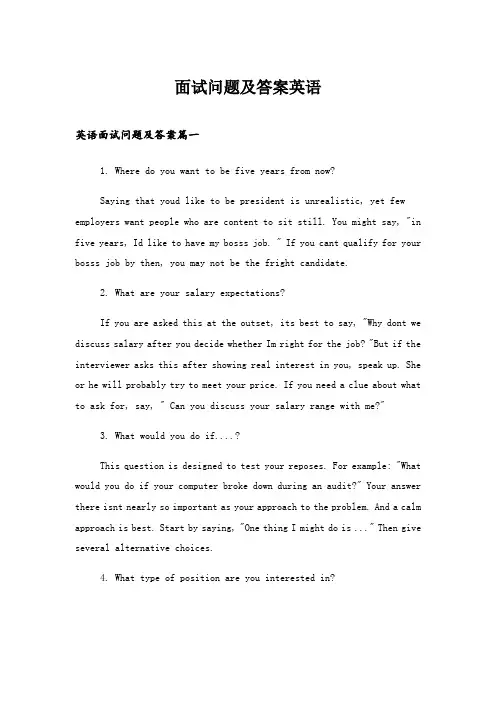
面试问题及答案英语英语面试问题及答案篇一1. Where do you want to be five years from now?Saying that youd like to be president is unrealistic, yet few employers want people who are content to sit still. You might say, "in five years, Id like to have my bosss job. " If you cant qualify for your bosss job by then, you may not be the fright candidate.2. What are your salary expectations?If you are asked this at the outset, its best to say, "Why dont we discuss salary after you decide whether Im right for the job? "But if the interviewer asks this after showing real interest in you, speak up. She or he will probably try to meet your price. If you need a clue about what to ask for, say, " Can you discuss your salary range with me?"3. What would you do if....?This question is designed to test your reposes. For example: "What would you do if your computer broke down during an audit?" Your answer there isnt nearly so important as your approach to the problem. And a calm approach is best. Start by saying, "One thing I might do is ..." Then give several alternative choices.4. What type of position are you interested in?Job titles and responsibilities vary from firm to firm . So state your skills instead, such as "Im good at figure work," and the positions that require these skills , such as "accounts payable."5. Tell me something about yourself.Say youll be happy to talk about yourself, and ask what the interviewer wants to know. If this point is clarified, respond. If not, tell why you feel your skills will contribute to the job and the organization. This question gives you a great opportunity to sell yourself.6. Do you have any questions about the organization or the job?Employers like a candidate who is interested in the organization. so this is a perfect time to convey your interest and enthusiasm.7. What are you greatest weakness?Identify one or two, such as the following:" I tend to drive myself too hard", " I expect others to perform beyond their capacities", " I like to see a job done quickly, and Im critical if it isnt." Note these weaknesses could also be regarded as desirable qualities. The trick with this question is to describe a weakness so that it could also be considereda virtue.8. What didnt you like about previous jobs youve held?Discuss the things you didnt like, but avoid making slighting reference to any of your former employers.9. How do you spend your leisure time?Mention a cross section of interests-active and quiet, social and solitary -- rather just one.10. Are there any weaknesses in your education or experience?Take stock of your weaknesses before the interview. Practice discussing them in a positive light. Youll find that they are minor when discussed along with all the positive things you have to offer.英语面试问题及答案篇二面试例题1:What range of pay-scale are you interested in?Money is important, but the responsibility that goes along with this job is what interests me the most.To be frank and open with you, I like this job, but I have a family to support.面试例题2:What do you want most from your work?I hope to get a kind of learning to get skills from my work. I want to learn some working skills and become a professional in an industry.面试例题3:Why did you choose us?As the saying goes, "well begun is half done". Your company is a famous one in the industry and boasts a high reputation. I hope to choose your company as the beginning of my career. I can not only learn new things, but set a solid foundation for my future career as well.面试例题4:What do you hope this job will give you?I hope this job will give me a chance to take responsibility. I think people can only become mature by taking on responsibility. I hope this work will give me the chance to develop fully.面试例题5:Why should I hire you?I feel that my qualifications match your job description. I have a proven track record in resolving problems, multitasking, and dealing with customers, as you can see from my resume.面试例题6:What can you offer this company?In addition to the skills and experiences we discussed, Im an extremely hard worker, Im very thorough and methodical, I get along great with people, and Im a quick learner.面试例题7:Great! So when can you start?I have to give two weeks notice, which is just enough time to complete my current project. I can start any time after that.面试例题8:Can you tell me some of your strengths and weaknesses?Im loyal, honest, I manage my time effectively, I always follow through on my work, and I have great computer skills. Umm, I cant really say I have any major weakness that affects my performance at work. I believe in continual learning and on-the-job training I can perform even better. Sometimes, I think Im too hard-working, but I really love my work.英语面试问题及答案篇三面试例题1:How do you handle your conflict with your colleagues in your work?I will try to present my ideas in a more clear and civilized manner in order to get my points across.面试例题2:How long would you like to stay with this company?I will stay as long as I can continue to learn and to grow in my field.面试例题3:What contribution did you make to your current (previous) organization?I have finished three new projects, and I am sure I can apply my experience to this position.面试例题4:Why did you leave your last job?Well, I am hoping to get an offer of a better position. If opportunity knocks, I will take it.I feel I have reached the glass ceiling in my current job. I feel there is no opportunity for advancement.面试例题5:What leadership qualities did you develop as an administrative personnel?I feel that learning how to motivate people and to work together asa team will be the major goal of my leadership.I have refined my management style by using an open-door policy.面试例题6:How would your friends or colleagues describe you?Pause a few seconds.They say Mr. Chen is an honest, hardworking and responsible man who deeply cares for his family and friends.They say Mr. Chen is a friendly, sensitive, caring and determined person.面试例题7:What are your strongest traits?Helpfulness and caring.Adaptability and sense of humor.Cheerfulness and friendliness.面试例题8:What personality traits do you admire?I admire a person who is honest, flexible and easy-going.I like people who possess the can-do spirit.。
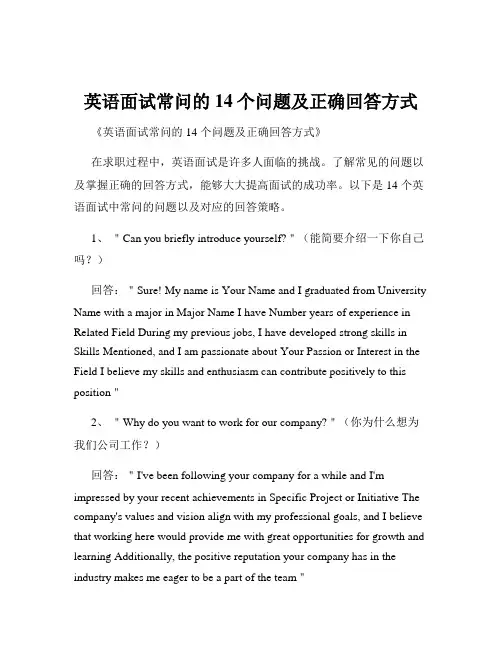
英语面试常问的14个问题及正确回答方式《英语面试常问的 14 个问题及正确回答方式》在求职过程中,英语面试是许多人面临的挑战。
了解常见的问题以及掌握正确的回答方式,能够大大提高面试的成功率。
以下是 14 个英语面试中常问的问题以及对应的回答策略。
1、"Can you briefly introduce yourself?"(能简要介绍一下你自己吗?)回答:"Sure! My name is Your Name and I graduated from University Name with a major in Major Name I have Number years of experience in Related Field During my previous jobs, I have developed strong skills in Skills Mentioned, and I am passionate about Your Passion or Interest in the Field I believe my skills and enthusiasm can contribute positively to this position"2、"Why do you want to work for our company?"(你为什么想为我们公司工作?)回答:"I've been following your company for a while and I'm impressed by your recent achievements in Specific Project or Initiative The company's values and vision align with my professional goals, and I believe that working here would provide me with great opportunities for growth and learning Additionally, the positive reputation your company has in the industry makes me eager to be a part of the team"3、"What are your strengths?"(你的优点是什么?)回答:"I consider my strengths to be my strong communication skills I'm able to effectively convey my ideas and listen to others' perspectives Also, I'm highly organized and detailoriented, which helps me handle tasks efficiently and accurately Another strength of mine is my ability to adapt quickly to new situations and learn new skills For example, in Past Experience, I was able to master a new software within a short period and apply it to improve the work process"4、"What are your weaknesses?"(你的缺点是什么?)回答:"One area I'm constantly working on improving is my public speaking skills While I can communicate well in oneonone or small group settings, I get a bit nervous when presenting to a large audience However,I've been taking courses and actively seeking opportunities to overcome this weakness Another weakness I have is that sometimes I tend to be a perfectionist, which can lead to spending more time on a task than necessary I'm learning to find the right balance between quality and efficiency"5、"Tell me about your greatest achievement"(谈谈你最大的成就。
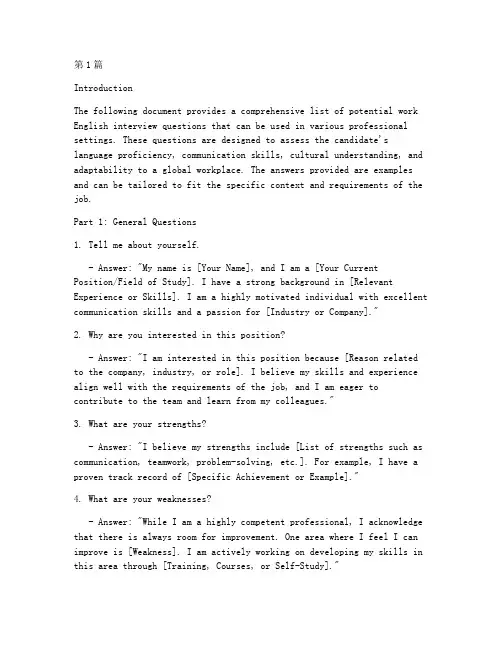
第1篇IntroductionThe following document provides a comprehensive list of potential work English interview questions that can be used in various professional settings. These questions are designed to assess the candidate's language proficiency, communication skills, cultural understanding, and adaptability to a global workplace. The answers provided are examples and can be tailored to fit the specific context and requirements of the job.Part 1: General Questions1. Tell me about yourself.- Answer: "My name is [Your Name], and I am a [Your CurrentPosition/Field of Study]. I have a strong background in [Relevant Experience or Skills]. I am a highly motivated individual with excellent communication skills and a passion for [Industry or Company]."2. Why are you interested in this position?- Answer: "I am interested in this position because [Reason related to the company, industry, or role]. I believe my skills and experience align well with the requirements of the job, and I am eager tocontribute to the team and learn from my colleagues."3. What are your strengths?- Answer: "I believe my strengths include [List of strengths such as communication, teamwork, problem-solving, etc.]. For example, I have a proven track record of [Specific Achievement or Example]."4. What are your weaknesses?- Answer: "While I am a highly competent professional, I acknowledge that there is always room for improvement. One area where I feel I can improve is [Weakness]. I am actively working on developing my skills in this area through [Training, Courses, or Self-Study]."5. How do you handle stress and pressure?- Answer: "I believe that stress and pressure are natural parts of any job. To handle them, I try to maintain a calm demeanor andprioritize tasks effectively. I also find that taking short breaks and staying organized help me stay focused and productive."Part 2: Communication Skills6. Can you describe a time when you had to explain a complex concept toa non-expert?- Answer: "Certainly. In my previous role at [Company], I had to explain a [Complex Concept] to a client who had no technical background.I started by asking questions to understand their level of understanding and then used simple language and analogies to break down the concept. This approach helped the client grasp the information effectively."7. How do you ensure effective communication in a team setting?- Answer: "To ensure effective communication in a team setting, I make sure to [List Strategies such as regular meetings, clear communication channels, active listening, etc.]. I also encourage open dialogue and make sure that everyone's opinions and ideas are heard and respected."8. Can you give an example of a time when you had to negotiate adifficult situation?- Answer: "In my last job, I had to negotiate with a supplier who was not meeting our delivery deadlines. I approached the situation by understanding the supplier's constraints and proposing a mutually beneficial solution. By demonstrating empathy and a willingness to find a compromise, we were able to resolve the issue and maintain a positive working relationship."Part 3: Cultural Understanding and Adaptability9. How do you adapt to a different culture in the workplace?- Answer: "Adapting to a different culture in the workplace is important for success. I start by researching the cultural norms and practices of the new environment. I also make an effort to learn the local language and engage with colleagues to understand their perspectives and values."10. Can you give an example of a time when you had to work with someone from a different cultural background?- Answer: "In my current role, I work with a team member from Japan. To ensure effective collaboration, I have learned about Japanese business etiquette and communication styles. This has helped me understand their expectations and work more effectively with them."11. How do you handle conflicts in a multicultural environment?- Answer: "In a multicultural environment, conflicts can arise due to differences in opinions or misunderstandings. I approach conflicts by maintaining an open mind, listening to all sides, and seeking a solution that respects everyone's viewpoints. I also ensure that my communication is clear and respectful to avoid further misunderstandings."Part 4: Professional Experience and Skills12. Can you describe your most significant professional achievement?- Answer: "One of my most significant professional achievements was [Achievement]. This involved [Description of the project, challenges faced, and the outcome]. I am proud of this achievement because [Reason for pride or impact on the company or team]."13. What is your experience with [Specific Software or Tool]?- Answer: "I have [Number] years of experience with [Software or Tool]. I am proficient in [List Key Features or Skills]. I have used it extensively in [Previous Roles or Projects], and I am confident in my ability to [List Additional Skills or Abilities]."14. How do you stay updated with the latest trends and developments in your field?- Answer: "I stay updated with the latest trends and developments in my field through [List of Sources such as professional journals, online courses, industry conferences, etc.]. I also engage in continuous learning by participating in workshops and webinars to enhance my knowledge and skills."Part 5: Questions for the Interviewer15. What are the company's values, and how do they reflect in the workplace?- Answer: "The company's values of [List Values] are evident in the workplace through [Examples of how the values are demonstrated]. I am excited to be part of a company that shares these values and looks to foster a positive and inclusive work environment."16. What is the typical career progression for someone in this role?- Answer: "The typical career progression for someone in this role includes [List Potential Positions or Opportunities]. The company is known for its [List Growth Opportunities], and I am eager to grow with the organization."17. How would you describe the company culture?- Answer: "The company culture is [Describe the culture in terms of values, work environment, team dynamics, etc.]. I am particularly drawn to the company's [Specific Aspect of the Culture], as it aligns with my own work style and values."ConclusionThis document provides a comprehensive list of work English interview questions and sample answers. It is important to remember that the answers should be tailored to fit the individual's experiences and the specific requirements of the job. By preparing thoughtful and detailed responses to these questions, candidates can demonstrate theirsuitability for the role and their commitment to professional growth.第2篇IntroductionA work English interview is a crucial step for candidates seeking employment in English-speaking environments. It is designed to assess the candidate's proficiency in English, as well as their communication skills, professional demeanor, and cultural fit within the organization. This guide provides a comprehensive list of work English interview questions, categorized by different aspects of the interview process. The questions are designed to be challenging yet relevant, ensuring that candidates are well-prepared for the interview.I. General Introduction and Background1. Tell us about yourself.2. Why did you decide to apply for this position?3. What motivated you to pursue a career in [your field]?4. Can you describe your academic and professional background?5. What are your strengths and weaknesses?6. How would your previous colleagues describe you?7. What are your long-term career goals?8. How do you handle stress and pressure in the workplace?9. Can you give an example of a time when you had to overcome adifficult situation at work?10. How do you stay updated with the latest trends and developments in your field?II. Language Proficiency and Communication Skills11. What level of English proficiency do you have?12. Can you describe a situation where you had to use English to communicate with a non-native speaker?13. How do you improve your English language skills?14. What are your favorite English learning resources (books, websites, apps, etc.)?15. How would you describe your listening, speaking, reading, andwriting skills in English?16. Can you give an example of a complex sentence you have written in English?17. How would you explain a technical concept to a non-technical audience in English?18. What are some common English idioms or phrases that you find useful in a professional setting?19. How do you ensure effective communication in a team that includes members from different linguistic backgrounds?20. Can you describe a time when you had to resolve a misunderstanding or conflict using English?III. Professional Experience and Skills21. What are your key responsibilities in your current role?22. Can you describe a successful project you have worked on?23. How do you prioritize your tasks and manage your time?24. What are your technical skills and software proficiency?25. How do you approach problem-solving and decision-making?26. Can you give an example of a time when you had to adapt to a new technology or process?27. How do you ensure quality control in your work?28. What are your experience with teamwork and collaboration?29. Can you describe a situation where you had to lead a team or project?30. How do you handle feedback and constructive criticism?IV. Cultural Awareness and Adaptability31. How would you describe your work style and how it fits into a team environment?32. Can you give an example of a time when you had to work with a team that had different cultural backgrounds?33. How do you handle cultural differences in a professional setting?34. What are your thoughts on diversity and inclusion in the workplace?35. How do you stay motivated and engaged in your work?36. What are some of the challenges you have faced while working in an English-speaking environment?37. How do you manage cross-cultural communication challenges?38. Can you describe a situation where you had to adjust to a new work culture?39. How do you maintain a positive attitude and work ethic in a challenging work environment?40. What are your expectations of a work environment in an English-speaking country?V. Situational and Behavioral Questions41. You are working on a project with a tight deadline. A team member is not meeting their deadlines. How would you handle this situation?42. Your manager asks you to complete a task that goes against your ethical beliefs. How would you respond?43. You are in a meeting and someone is speaking too quickly for you to understand. What would you do?44. Your team is working on a project, but there is a conflict between two team members. How would you resolve it?45. You are responsible for delivering a presentation to a group of stakeholders. The presentation is not going well. How would you handle the situation?46. You have been asked to take on additional responsibilities. How would you manage your time to ensure you can meet all your commitments?47. You receive negative feedback on your work. How would you respond and what steps would you take to improve?48. You are working on a team project, but one team member is not contributing. How would you address this issue?49. You are asked to work overtime to meet a project deadline. How would you balance this with your personal life?50. You are in a meeting and someone is making a false statement. How would you respond?ConclusionThis comprehensive guide to work English interview questions covers a wide range of topics that are essential for assessing a candidate's suitability for a job in an English-speaking environment. By preparing for these questions, candidates can demonstrate their language proficiency, communication skills, professional experience, and cultural adaptability, increasing their chances of success in the interview process.第3篇IntroductionAs the global business landscape becomes increasingly interconnected, proficiency in English has become a vital skill for professionals worldwide. This guide provides a comprehensive list of work English interview questions that can help both candidates and interviewers assess language proficiency and suitability for a job. The questions are categorized into different sections, including general communication, business vocabulary, professional scenarios, and cultural awareness.Section 1: General Communication1. Tell me about yourself.- Answer: "I am [Your Name], and I have [Your educational background] in [Your field of study]. I have [Number of years] of experience in [Your industry] and have worked with [Number of people/teams] on various projects. My strengths include [List of strengths], and I am passionate about [Your passion]."2. What are your strengths and weaknesses?- Answer: "My strengths include [List of strengths], such as [Skill 1], [Skill 2], and [Skill 3]. I believe my weaknesses are [List of weaknesses], but I am actively working on improving them through [ways to improve]."3. How do you handle stress and pressure at work?- Answer: "I believe in maintaining a calm and focused approach to handle stress and pressure. I take regular breaks, prioritize tasks, and seek support from my team when needed."4. How do you communicate effectively with people from different cultures?- Answer: "I believe in being respectful and open-minded when communicating with people from different cultures. I research cultural norms and etiquette, use clear and concise language, and show empathy towards their perspectives."5. What is your preferred communication style?- Answer: "I prefer a [Active/Passive] communication style, which means I am [Proactive/Reactive] in initiating and maintaining conversations. I believe this style helps in building strong relationships and ensuring effective communication."Section 2: Business Vocabulary6. Explain the term 'ROI' and how it is used in business.- Answer: "ROI stands for Return on Investment. It is a financial metric used to evaluate the efficiency or profitability of an investment. It is calculated by dividing the net profit from the investment by the cost of the investment."7. What is the difference between 'budget' and 'forecast'?- Answer: "A budget is a financial plan that outlines expected income and expenses over a specific period. A forecast, on the other hand, isan estimate of future financial performance based on historical data and current trends."8. Explain the term 'SWOT analysis'.- Answer: "SWOT analysis is a strategic planning tool used toidentify Strengths, Weaknesses, Opportunities, and Threats related to business competition or project planning."9. What is the purpose of a 'meeting agenda'?- Answer: "A meeting agenda is a document that outlines the topics to be discussed, the time allocated for each topic, and the expected outcomes of the meeting. It helps in ensuring that the meeting is productive and focused."10. What is a 'benchmark'?- Answer: "A benchmark is a standard or point of reference used to compare the performance of a company, product, or service against competitors or industry norms."Section 3: Professional Scenarios11. How would you handle a situation where a client is dissatisfied with your work?- Answer: "I would first apologize for any inconvenience caused and listen to the client's concerns. Then, I would identify the root causeof the issue and propose a solution that addresses the client's needsand expectations."12. What would you do if you found a mistake in a document before it was sent to a client?- Answer: "I would immediately notify my supervisor and provide details about the mistake. I would then work on correcting the error and resubmit the document to ensure its accuracy."13. How do you prioritize tasks when you have multiple deadlines?- Answer: "I would prioritize tasks based on their importance and urgency. I would identify the most critical tasks and allocate my time and resources accordingly, ensuring that deadlines are met."14. What would you do if you were unable to complete a task on time?- Answer: "I would communicate the situation to my supervisor and explain the reasons for the delay. I would then propose an alternative timeline or seek additional resources to complete the task as soon as possible."15. How do you ensure that your work is of high quality?- Answer: "I ensure high-quality work by following a systematic approach. I double-check my work, seek feedback from colleagues, and stay updated with industry standards and best practices."Section 4: Cultural Awareness16. How do you adapt to a new work culture?- Answer: "I would research the cultural norms and expectations of the new work environment. I would observe and learn from my colleagues, ask questions when needed, and adapt my behavior and communication style accordingly."17. What is your view on work-life balance?- Answer: "I believe in maintaining a healthy work-life balance to ensure both personal and professional well-being. I set clear boundaries between work and personal life and prioritize tasks based on their importance and urgency."18. How do you handle conflicts at work?- Answer: "I handle conflicts by remaining calm and objective. I would listen to both sides of the issue, identify the root cause, and propose a solution that is fair and acceptable to all parties involved."19. What are your expectations from a work environment?- Answer: "I expect a supportive and collaborative work environment where open communication is encouraged, and opportunities for growth and development are provided. I also value respect and diversity among colleagues."20. How do you stay motivated at work?- Answer: "I stay motivated by setting personal and professional goals, celebrating achievements, and seeking challenges. I also maintain a positive attitude and surround myself with a supportive network of colleagues."ConclusionThis comprehensive guide provides a wide range of work English interview questions that can help candidates and interviewers assess language proficiency and suitability for a job. By preparing for these questions and understanding the underlying skills and competencies required in a professional environment, candidates can present themselves as confident and capable individuals ready to contribute to their organization's success.。
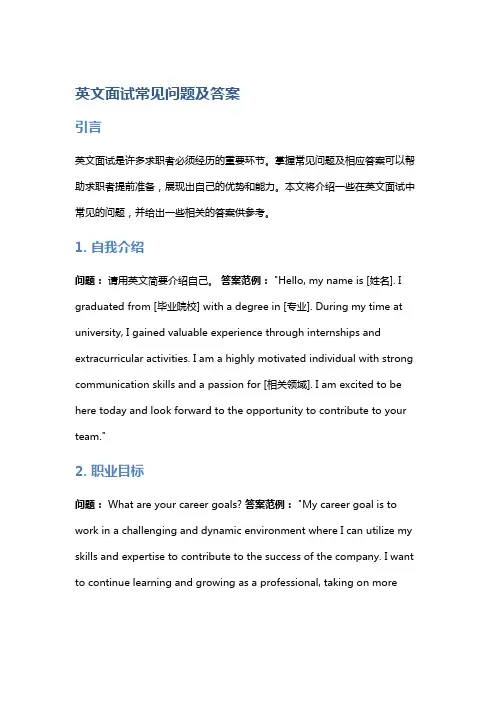
英文面试常见问题及答案引言英文面试是许多求职者必须经历的重要环节。
掌握常见问题及相应答案可以帮助求职者提前准备,展现出自己的优势和能力。
本文将介绍一些在英文面试中常见的问题,并给出一些相关的答案供参考。
1. 自我介绍问题:请用英文简要介绍自己。
答案范例: "Hello, my name is [姓名]. I graduated from [毕业院校] with a degree in [专业]. During my time at university, I gained valuable experience through internships and extracurricular activities. I am a highly motivated individual with strong communication skills and a passion for [相关领域]. I am excited to be here today and look forward to the opportunity to contribute to your team."2. 职业目标问题: What are your career goals? 答案范例: "My career goal is to work in a challenging and dynamic environment where I can utilize my skills and expertise to contribute to the success of the company. I want to continue learning and growing as a professional, taking on moreresponsibilities and eventually reaching a leadership position in my field of interest."3. 团队合作问题: Can you tell me about a time when you worked effectively as part of a team? 答案范例: "I had an opportunity to work on a group project during my last semester at university. We were assigned a complex task that required us to collaborate and divide the work efficiently. I took the initiative to organize regular team meetings, where we discussed our progress, addressed any challenges, and made necessary adjustments to our plans. By maintaining clear communication and fostering a supportive environment, we successfully completed the project ahead of schedule."4. 解决问题能力问题: How do you approach problem-solving? 答案范例: "When faced with a problem, I like to approach it systematically. First, I gather all relevant information and analyze the situation thoroughly. Then, I brainstorm potential solutions and evaluate their pros and cons. Once I have chosen the best course of action, I take decisive steps to implement the solution while keeping stakeholders informed of my progress. I am also open to feedback and willing to make adjustments if necessary."5. 过去的挑战问题: Can you describe a challenging situation you faced in your previous job or internship? How did you handle it? 答案范例: "In my previous job, there was a tight deadline for an important project that seemed almost impossible to meet initially due to resource constraints. However, I gathered a cross-functional team and delegated tasks effectively based on each team member's strengths and expertise. We worked long hours, communicated frequently with stakeholders to manage expectations, and made strategic decisions prioritizing critical aspects of the project. Through effective teamwork and dedication, we successfully completed the project within the given timeframe without compromising quality."结论以上只是一些常见的英文面试问题及回答范例,每个人的经历和背景不同,所以可以根据个人情况进行适当调整和补充。
职场英文面试常见问题三 By Ashley What are the reasons for your success in this profession? Wants to know what makes tick. “I attribute my success to three reasons: First, I’ve always received support from coworkers, which encourages me to be cooperative and look at my specific job in terms of what we as a department are trying to achieve. That gives me great pride in my work and its contribution to the department’s efforts, which is the second factor. Finally, I find that every job has its problems, and while there’s always a costly solution, there’s usually an economical one as well, whether it’s in terms of time or money.” Then give example from your experience that illustrates those points.
What is your energy level like? Describe a typical day. Demonstrate good use of your time. “At the end of the day when I’m ready to go home, I make a rule always to type one more letter[make one more call, etc.] and clear my desk for the next day.”
Why do you want to work here? Researched the company and built a dossier. Reply with the company’s attributes as you see them. Talk about their needs. You wish to be a part of the company project and can make a definite contribution to company goals. “I’m not looking for just another paycheck. I enjoy my work and am proud of my profession. Your company produces a superior product/provides a superior service. I share the values that make this possible, which should enable me to fit in and complement the team.”
What kind of experience do you have for this job? Looking for someone who can contribute quickly to the current project, problem solver. “My high-speed machining background and familiarity with your equipment will allow me to contribute quickly. I understand deadlines, delivery schedules, and the importance of getting the product shipped. Finally, my awareness of economy and profit has always kept reject to a bare minimum. “
What are the broad responsibilities system analysts? While the responsibilities of my job title vary somewhat from company to company, at my current/last job, my responsibilities include… Describe how your job relates to the overall goals of your department and company The quality of my work directly affects the ability of others to do their work properly. As a team member, one has to be aware of the other players. What aspects of your job do you consider most crucial? Determine time management, prioritization skills, and any inclination for task avoidance.
Are you willing to go where the company sends you? Ask, “Are you talking about business travel, or is the company relocating?” “Yes”
What did you like/dislike about your last job? You liked everything about your last job. Your company taught you the importance of certain keys from the business, achievement, or professional profile. Keep answer short and positive. Only one negative about past employers. “I really liked everything about the job. The reason I want to leave it its to find a position where I can make a greater contribution. You see, I work for a large company that encourages specialization of skills. The smaller environment you have here will, as I said, allow me to contribute far more in different areas”. If interview with a large company, “I work for a small company and don’t get the time to specialize in one or two major areas.”
What is the least relevant job you have held? If your least relevant job is not on your resume, it shouldn’t be mentioned. “Every job I’ve held has given me new insights into my profession, and the higher one climbs, the more important the understanding of the lower-level, more menial jobs. They all play a role in making the company profitable. And anyway, it’s certainly easier to schedule and plan work when you have first-hand knowledge of what others will have to do to complete their tasks.”
What have you learned from jobs you have held? Tie your answer to your business and professional profile. “More than anything, I have learned that what is good for the company is good for me. So I listen very carefully to directions and always keep my boss informed of my actions.”
How do you feel about your progress to date? You see each day as an opportunity to learn and contribute. “Given the parameters of my job, my progress has been excellent. I know the work, and I am just reaching that point in my career when I can make significant contributions.”